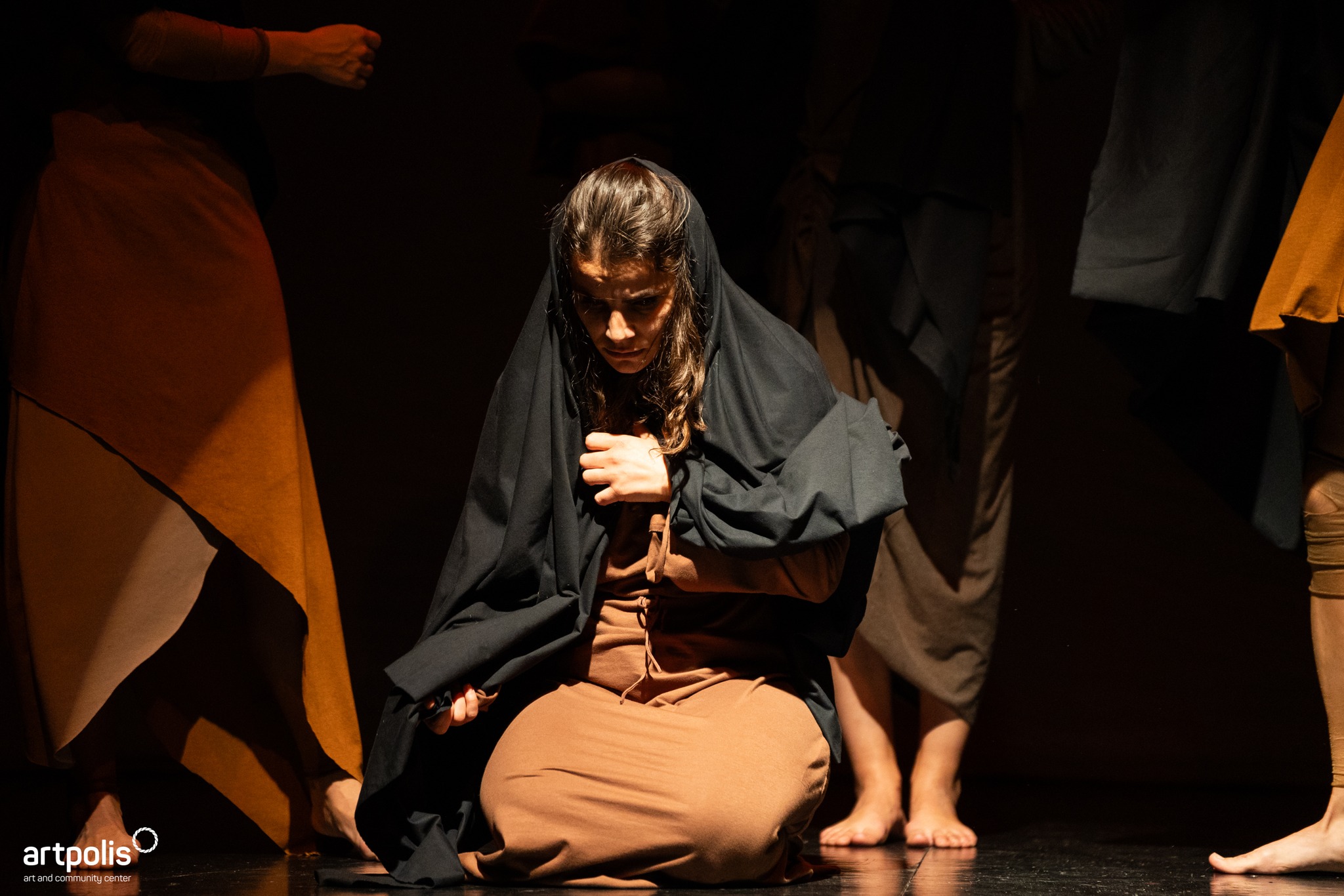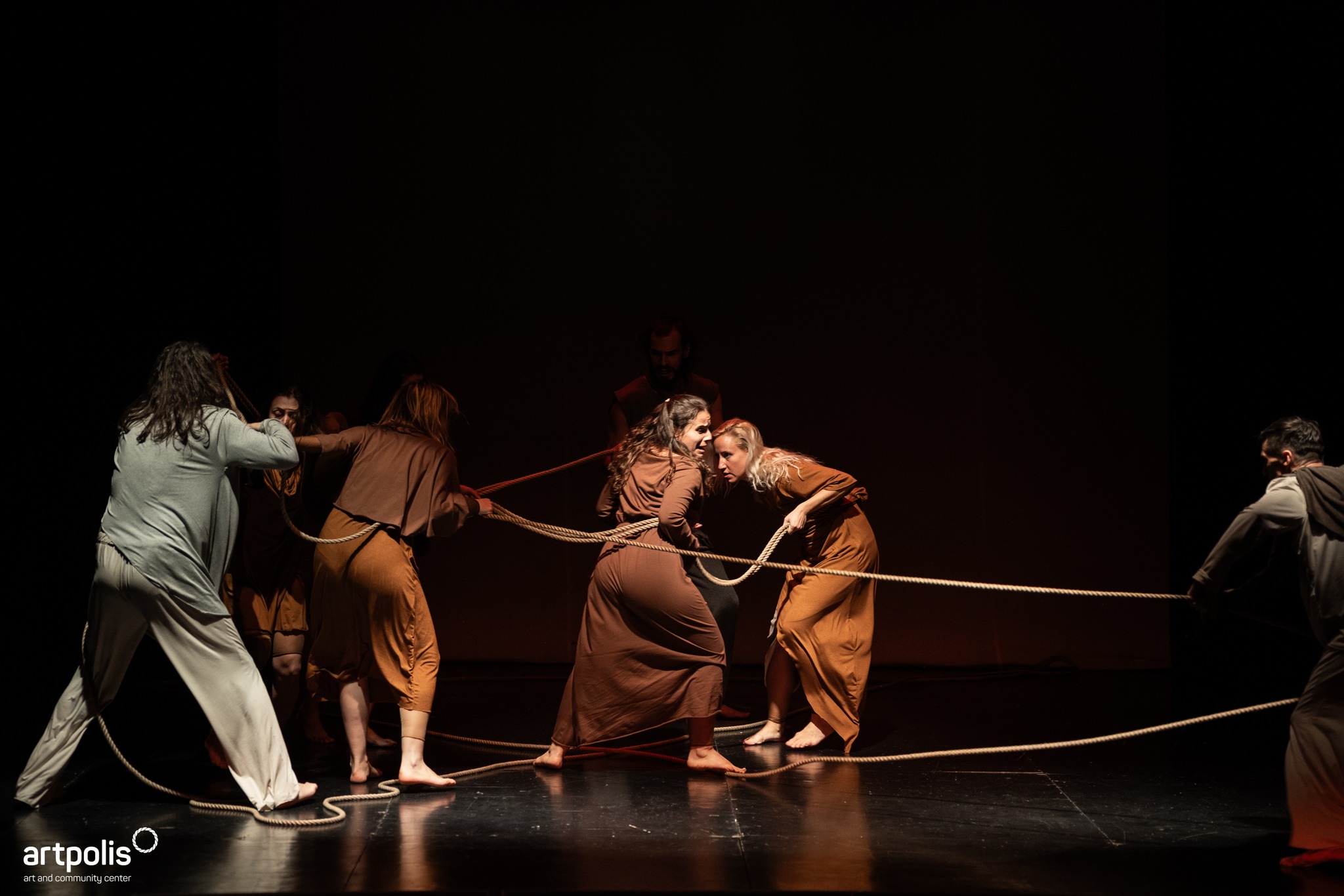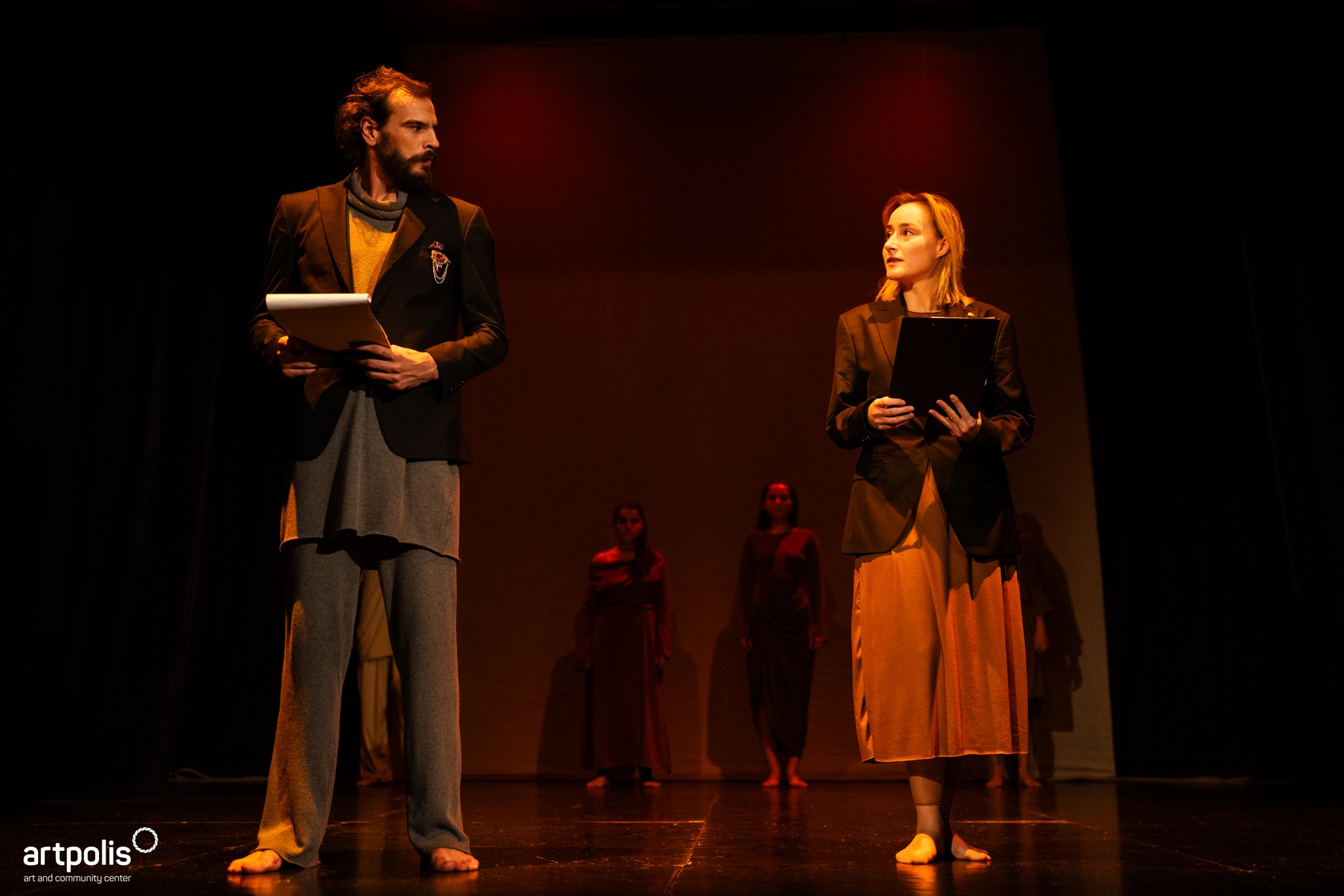A bilingual play by a Kosovar and a Serbian director showcased the suffering of women in the aftermath of wars. It comes as a timeless reminder to prioritize peace, break the cycle of conflict, and advocate for the voices of women.
On November 23, the Dodona Theater became the crucible for the timeless narrative of human suffering, as “Trojan Women – Replica” unfolded the tragic saga from Troy to the modern world tragedies. Euripides’ lament echoed through the performance, reminding us that the essence of Troy, with its pain and malevolence, still permeates our global reality. “Troy is still everywhere,” exclaimed Euripides, drawing haunting parallels, “the whole world is our ancient Troy and your modern Troy. Thousands of horses not made of wood but of steel… flying. Iron pegasi that drop bombs everywhere”.
Directed by feminist directors Zana Hoxha and Dijana Milošević, and brought to life by the talented ensembles of Artpolis and Dah Theater, the bilingual production, featuring both Albanian and Serbian languages, showcased the suffering of women in the aftermath of wars. The play served as a timeless reminder to prioritize peace, break the cycle of conflict, and advocate for the voices of women.
Through this joint collaboration, Artpolis and Dah Theater transcended national barriers by creating a safe space to demonstrate the power of art, as Hoxha said: “The synergy created between us as artists and feminist collectives transcended national and language barriers, and it created a space for the power of theater to influence our minds and hearts while creating a safe zone for a joint experience”.

Women in black, Trojan Women – Replica play, November 2023. Photo credits: Esad Duraki
Shpëtim Selmani, the author of the contemporary text, noted that the world suffers from multiple references today, because, in principle, the problems of the world are the same — all subjects are the same since antiquity: love, war. “We still face ancient problems in a different form; what has changed is the way of life. But, something inside us, in the human substance, is still the same because we have not eradicated war. States and nations remain dominant; borders are actual, and the power of the strong over the weak is still evident — nothing has really changed”.
In reflecting on the collaborative process, Dijana Milošević shared insights into the challenges faced.
“The biggest challenge in this collaboration maybe was the short time that we had so it was very intense. We had a week in Belgrade, and a week in Prishtina and then of course months in between and before to exchange ideas and dramaturgs were sending the text and they were having zoom meetings and so on but it was a big pressure. But, what is helpful is to know that this is the process that we are going to collaborate and develop even more in the next year”, said Milošević.
For her the language was a challenge, but it was a nice one. “I found Albanian language really beautiful, I think it has this special kind of vibration and that is also like a kind of transmitting emotions and meaning even if you don’t understand it”.
Hoxha and Milošević, transcend linguistic barriers, highlighting the universal nature of pain. The bilingual format, far from hindering understanding, became a bridge, and emphasized the universal resonance of this presentation, as one audience member noted, “I don’t understand the Serbian language, but I understood the whole presentation, because the war is equally bad in every corner of the world; because pain needs no translation, but also because art is the universal language of this world.”

The abuse, Trojan Women – Replica play, November 2023. Photo credits: Esad Duraki
Unveiling the vulnerability and resilience of women in the face of oppression
From the ruins of Troy to the “Women in Black,” this performance delves deep into the anguish experienced by women, examining the repercussions of conflict and their enduring resilience. It not only illuminates the profound effects of war on women but also functions as a call to action, compelling societies to safeguard vulnerable populations and amplify the voices of women in the relentless pursuit of lasting peace.
Characters like Hecuba, Kasandra, and Andromaka emerged as potent symbols, emphasizing the resilience of women amidst political turmoil.
As one of the audience members reflected on the presentation of “Trojan Women – Replica”, the emotional intensity of the performance resonated deeply with the universal experience of maternal love and loss.
“Since I experienced the last war in Kosova as a child, there is no question that the war is one of my biggest life traumas, which from time to time, consciously, I try to deal with and process. But I must emphasize that this trauma of my past has taken on two more dimensions since I became a mother – the fear of “how would I protect my children if the war were to repeat”, and understanding and gratitude for my parents for how overwhelmed they were during the war, precisely for how they faced the fear for our safety as children,” added a woman present in the audience.
One of the most moving scenes, even for the director, Milošević, was the moment when men began to abuse women by tying them up after they had celebrated together. Milošević questions the role of propaganda and information dissemination in fostering such drastic changes, emphasizing the contemporary relevance of these narratives on a global scale and lamenting their unfortunate manifestation in the local context.
“It reminds me so much of the stories from our region. The neighbors of yesterday or today have actually become the abusers, and that, for me, is still something that I can hardly understand—if I can understand it at all.
How could you turn against your neighbor? How could those who were friends for ages, celebrated together, shared life together, suddenly become enemies overnight? What kind of propaganda needs to happen, or what kind of information is not given to the people, for such a drastic change to occur? This, for me, reflects contemporary stories happening everywhere in the world and unfortunately, it has happened to us here,” said Milošević.

The gods, Trojan Women – Replica play, November 2023. Photo credits: Esad Duraki
A collage of voices uniting against the gods of war
In the aftermath of the powerful presentation, the audience engaged in a dialogue that underscored the impact of art in fostering understanding and cooperation. The collaboration between Artpolis and Dah Theater, exemplified the potential for art to transcend borders and promote cooperation.
Dijana Milošević, reflecting on the collaboration, highlighted the role of art and activism as pillars for creating sustainable peace. The collaboration served as a bridge between communities, challenging propaganda and fostering empathy.
As Milica Petrovic, actress from Dah Theater expressed, “Art has a really important role in peacebuilding actually. Those are small steps, but really important.”
For the audience, this collaboration demonstrated that even in the face of political tensions, art can soften divisions, contribute to communication, and inspire peace.
“This presentation and cooperation come at a crucial juncture, considering the current tensions between Kosova and Serbia. It serves as an example that, if politics creates tensions, it is the use of art that softens them, contributing to communication, cooperation, and peace,” was one of the comments in the audience, after the presentation.
The production “Trojan Women – Replica” also delivered a pointed critique of contemporary “Gods”—politicians. To them, millions of victims are merely statistics, and they view the consequences of their actions with indifference, unable to transcend their own egos, they are so distant to the pain of the people. They remain detached from the suffering of the people.
Dijana Milošević raises the question, “Who are the gods for us?” and adds, “The gods are those who decide about our lives, and today, politicians, with one signature, decide about the lives of people. They make decisions that will actually affect the lives of millions, and then they shift responsibility to us. Unfortunately, in many countries, including our country Serbia, politicians turn responsibility to the people instead of taking it upon themselves.”
“Trojan Women – Replica,” still in the creation process, stands as a testament to the enduring power of art to awaken awareness, challenge perceptions, and ultimately contribute to the pursuit of a more peaceful world.
For Shpëtim Selmani, the collaboration between Artpolis and Dah Theater was particularly significant. He emphasizes the importance of these voices in striving to create a better world for everyone.
“I think that these collaborations should be pursued — these unique, special, and right voices must exist. I am pessimistic about the world changing, observing how politicians and the powerful maneuver. Still, I believe that such voices should never be extinguished”, notes Selmani.





